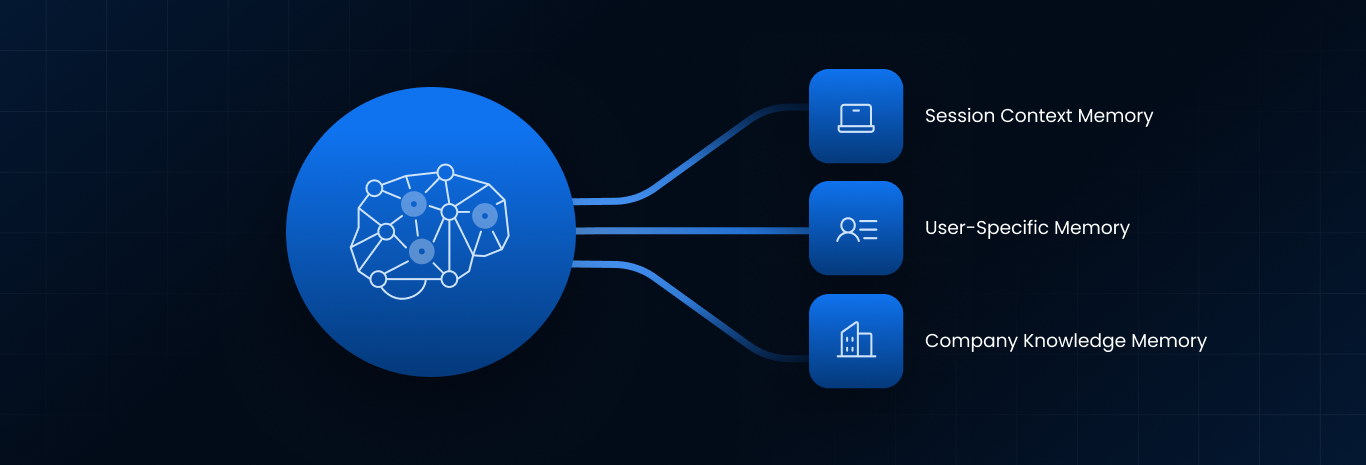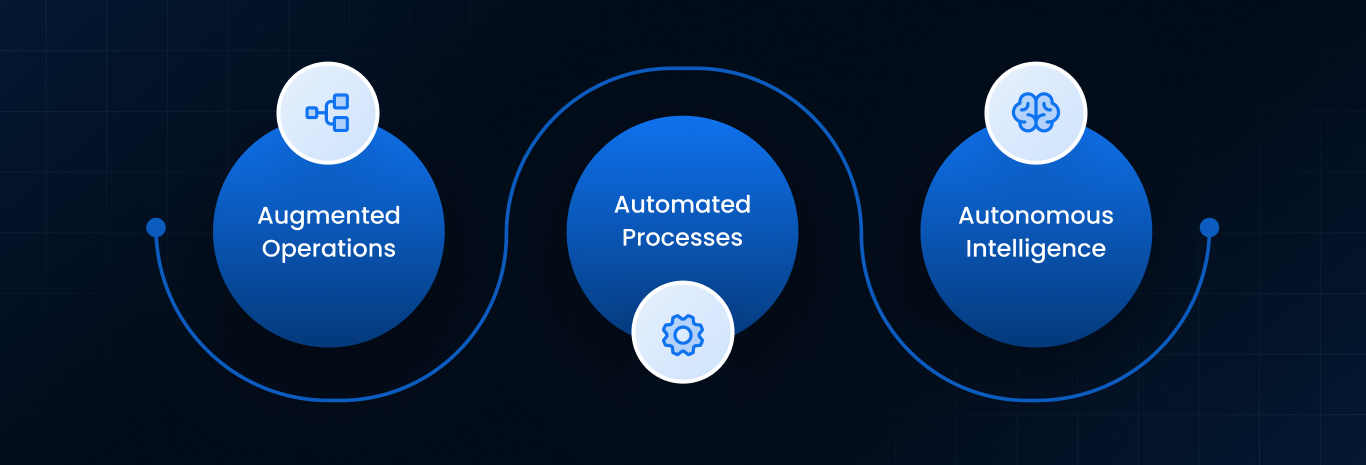Introduction
For CIOs and technology leaders managing complex enterprise operations in 2025, the conversation has shifted from simple automation to autonomous intelligence. The critical differentiator isn’t whether your AI can execute tasks, but whether it can remember context, understand your organization, and operate with the institutional knowledge of your best employees.
This transformation centers on Agentic AI memory – the foundation that turns reactive AI tools into proactive digital colleagues capable of managing end-to-end business processes across your entire enterprise ecosystem.
The Enterprise Reality: From Pilot Programs to Production Systems
In 2025, 80% of CIOs are investing in foundational AI capabilities while transitioning from experimental pilots to enterprise-wide implementations that deliver measurable ROI. The enterprises succeeding at scale understand that memory architecture determines whether AI becomes a productivity multiplier or just another point solution.
Three key priorities drive technology leaders toward memory-enabled agentic AI:
1. Operational Efficiency at Scale: AI must demonstrate cost reduction, workflow acceleration, and productivity gains across departments, not just in isolated use cases.
2. Enterprise Integration Without Disruption: Organizations need AI that enhances existing systems rather than requiring complete technology stack replacements.
3. Governance and Accountability: Every autonomous action must be traceable, compliant, and aligned with organizational policies and approval hierarchies.
The Three Pillars of Enterprise AI Memory
Enterprise-grade agentic AI requires a sophisticated memory architecture that mirrors how human colleagues understand and operate within organizations. This isn’t simple data storage – it’s contextual intelligence that enables autonomous decision-making.

Session Context Memory: Maintaining Conversational Intelligence
What it is: The live, ephemeral working set for current interactions – capturing user intent, conversation history, task progress, tool outputs, and multi-step workflow states as they unfold in real-time.
Why it matters for enterprises: Enables coherent conversations where AI understands references like “the purchase order we discussed” or “that approval I mentioned earlier.” This context retention keeps complex Autonomous Operating Procedures (AOPs) on track across multiple systems and stakeholders.
Consider an employee requesting equipment procurement. Session context memory allows the AI to maintain awareness of budget discussions, manager approvals, and technical specifications throughout a conversation that might span multiple departments and approval cycles.
User-Specific Memory: Personalized Enterprise Intelligence
What it is: Comprehensive employee profiles pulled from core enterprise systems – identity management, role hierarchies, approval authorities, location data, device assignments, training certifications, and historical interaction patterns from HRMS (Workday), ITSM (ServiceNow), ERP (SAP/Oracle), and CRM (Salesforce) platforms.
Why it matters for enterprises: Enables least-privilege operations and personalized responses based on actual organizational authority. The AI knows who can approve expenses up to specific amounts, which systems each employee can access, and what processes they’re authorized to initiate.
This prevents security violations while enabling autonomous workflows. A manager requesting team budget reallocation receives different options and approval paths than a individual contributor asking about expense policies.
Company Knowledge Memory: Institutional Intelligence
What it is: Your organization’s operational DNA – policies, standard operating procedures, approval matrices, vendor contracts, system integration specifications, compliance requirements, and historical decision patterns that define “how we do business.”
Why it matters for enterprises: Transforms generic AI responses into company-accurate actions that comply with your specific governance frameworks. This institutional memory enables compliance-safe automation that understands your regulatory environment, risk tolerance, and operational standards.
When processing vendor invoices, the AI knows your specific approval hierarchies, understands your vendor SLA terms, and follows your established escalation procedures rather than generic best practices.
Why Leena AI Delivers Superior Enterprise Memory Architecture
While enterprise AI vendors promise agentic capabilities, Leena AI has architected the industry’s most sophisticated memory system specifically for complex organizational environments.

WorkLM™: Enterprise-Trained Intelligence
Unlike competitors using consumer-trained models, Leena AI’s WorkLM™ is a proprietary 7 billion parameter model trained exclusively on 2 terabytes of enterprise workplace data. This fundamental architectural advantage means the AI natively understands business language, organizational hierarchies, and operational contexts that confuse generic models.
WorkLM™ doesn’t confuse “PTO” with “Purchase Order” or misunderstand approval chains – it comprehends enterprise complexity because it was built specifically for it.
Unified Orchestrator: Beyond Agent Coordination
Most enterprise AI solutions offer disconnected agents or basic multi-agent frameworks. Leena AI’s Master Orchestrator represents breakthrough architecture – a central intelligence layer that maintains contextual memory across agent handoffs while coordinating specialized capabilities across your entire technology stack.
When an employee initiates a complex workflow spanning HR onboarding, IT provisioning, and finance approval, the Orchestrator maintains context throughout the entire process, ensuring a consistent experience regardless of which systems are involved.
Industry-Leading Interoperability
Enterprise technology leaders face vendor lock-in concerns when investing in AI platforms. Leena AI solves this through Model Context Protocol (MCP) integration and Agent-to-Agent interoperability that preserves existing technology investments.
Your Microsoft Copilot Studio, ServiceNow Now Assist, or Salesforce Agentforce agents gain access to Leena AI’s 1,000+ enterprise integrations and memory architecture through standardized protocols. This approach enhances existing capabilities rather than requiring platform migration.
Proven Enterprise Scale
Leena AI serves 500+ global enterprises across 90+ countries, handling millions of daily interactions while maintaining enterprise-grade security compliance (HIPAA, GDPR, SOC 2, SOC 1, ISO 27001). This operational maturity eliminates risks associated with unproven AI vendors.
The Path to Autonomous Operations
Memory-enabled agentic AI represents the foundation for autonomous enterprise operations – where AI systems manage end-to-end business processes with minimal human intervention while maintaining accountability and governance.
Stage 1: Augmented Operations – AI agents assist employees by maintaining context across complex workflows, pulling relevant data from multiple systems, and providing personalized guidance based on organizational knowledge.
Stage 2: Automated Processes – AI agents own complete workflows, from initial request through final resolution, while maintaining audit trails and escalating exceptions based on stored organizational policies.
Stage 3: Autonomous Intelligence – AI agents proactively identify optimization opportunities, predict operational needs, and coordinate cross-departmental processes based on accumulated institutional memory.
This progression happens naturally when AI systems have robust memory architecture that learns organizational patterns, remembers successful strategies, and adapts to changing business conditions.

Implementation Strategy for Technology Leaders
Memory Architecture Assessment: Evaluate your current data architecture’s readiness for AI memory systems. Ensure clean data pipelines from HRMS, ITSM, ERP, and CRM platforms that can feed user-specific and company knowledge memory layers.
Governance Framework Development: Establish policies for AI memory retention, data access controls, and autonomous action authorities. Define which processes AI can execute independently versus those requiring human approval.
Integration Planning: Map existing enterprise systems and API capabilities. Prioritize high-impact use cases where memory-enabled AI can deliver immediate ROI while building foundational capabilities for broader deployment.
Security and Compliance Alignment: Ensure memory systems meet regulatory requirements and corporate data governance policies. Implement audit trails and access controls that maintain accountability for autonomous actions.
Measuring Enterprise Impact
Success metrics for memory-enabled agentic AI focus on operational transformation rather than traditional automation KPIs:
-
Process Autonomy Rate: Percentage of workflows completed without human intervention
-
Cross-System Integration Efficiency: Time reduction for multi-departmental processes
-
Decision Accuracy: AI autonomous decisions that align with organizational policies
-
Employee Productivity Gain: Time freed for strategic work versus routine operational tasks
-
Compliance Adherence: Autonomous actions that maintain regulatory compliance
These metrics reflect memory-enabled AI’s ability to operate as institutional intelligence rather than just task automation.
The Strategic Imperative
Organizations implementing sophisticated AI memory architecture create compounding competitive advantages. Every interaction teaches the system more about organizational patterns, successful strategies, and operational optimization opportunities. This institutional intelligence becomes increasingly valuable and difficult for competitors to replicate.
For CIOs and technology leaders responsible for enterprise transformation, the question isn’t whether to invest in AI memory capabilities, but which architecture can deliver autonomous operations while preserving governance, security, and accountability standards.
Leena AI’s proven enterprise memory architecture, guaranteed business outcomes, and commitment to interoperability make it the strategic choice for organizations serious about achieving autonomous intelligence at enterprise scale.
Frequently Asked Questions
What security measures protect sensitive organizational memory in AI systems?
Enterprise AI memory systems implement role-based access controls, data encryption, tenant isolation, and comprehensive audit trails. Leena AI maintains SOC 2, HIPAA, and GDPR compliance with automatic data retention policies that align with corporate governance requirements while separating training data from customer information.
Can AI memory systems integrate with existing enterprise software without major disruptions?
Yes, through API-driven integration and Model Context Protocol standards. Leena AI’s 1,000+ native integrations connect with HRMS, ITSM, ERP, and CRM platforms while preserving existing workflows and user experiences. The memory layer enhances current systems rather than replacing them.
What are the security implications of Leena AI's memory systems storing organizational data?
Leena AI implements enterprise-grade security with role-based access controls, data encryption, and compliance with HIPAA, GDPR, SOC2, SOC1, and ISO 27001 regulations. Memory data is isolated per tenant with automatic retention policies that align with corporate data governance requirements, and WorkLM training data remains separate from customer data.
What governance frameworks should CIOs establish for autonomous AI operations?
Implement clear policies for autonomous action authorities, escalation triggers, audit trail requirements, and compliance checkpoints. Define which processes AI can execute independently versus those requiring human approval, with regular review cycles to ensure alignment with business objectives and regulatory requirements.
How do memory-enabled AI agents coordinate across multiple enterprise departments?
Through unified orchestration platforms that maintain contextual memory across departmental handoffs. The AI understands cross-functional relationships, approval hierarchies, and process dependencies, enabling seamless coordination between IT, HR, Finance, and other departments while maintaining institutional knowledge.
What ROI should enterprises expect from implementing agentic AI memory systems?
Organizations typically achieve 70% self-service ratios, significant reduction in manual process handling, improved cross-departmental workflow efficiency, and substantial time savings for knowledge workers. Leena AI provides contractually guaranteed outcomes based on proven results across 400+ enterprise deployments.
Sources
- https://cio.economictimes.indiatimes.com/news/artificial-intelligence/cios-priorities-for-successful-ai-implementation-in-2025/124208813
- https://www.evanta.com/resources/cio/survey-report/top-3-priorities-for-cios-in-2025
- https://www.automationanywhere.com/rpa/autonomous-enterprise
- https://botscrew.com/blog/how-to-integrate-ai-agents-with-enterprise-systems/
- https://blogs.idc.com/2025/03/24/the-cio-imperative-six-priorities-for-the-ai-fueled-organization/
- https://www.deloitte.com/us/en/services/consulting/blogs/business-operations-room/autonomous-enterprise-how-ai-microsolutions-revolutionize-workflows.html
- https://learn.microsoft.com/en-us/azure/ai-services/language-service/orchestration-workflow/overview
- https://www.ibm.com/think/topics/ai-orchestration
- https://www.pwc.com/us/en/industries/tmt/library/tech-cio-priorities.html
- https://www.techmahindra.com/services/integrated-offerings/autonomous-operations/
- https://www.ey.com/content/dam/ey-unified-site/ey-com/en-gl/services/consulting/documents/ey-the-autonomous-enterprise-05-2025.pdf
- https://www.bcg.com/publications/2025/cios-role-in-ai-transformation-and-productivity
- https://www.neuralt.com/news-insights/ai-workflow-automation-and-orchestration-tools-for-enterprise
- https://www.automationanywhere.com/company/blog/automation-ai/becoming-autonomous-enterprise-how-build-ai-infused-operating-model
- https://www.infotech.com/research/ss/info-tech-s-best-of-2025-mid-year-report-it-moves-from-disruption-to-decisive-action
- https://www.bizdata360.com/ai-workflow-automation/
- https://kpmg.com/in/en/insights/2025/10/agentic-ai-the-future-of-autonomous-intelligence.html
- https://adapt.com.au/resources/articles/digital-transformation/5-cio-priorities-for-2025-it-modernisation-ai-business-value/
- https://solutionshub.epam.com/blog/post/ai-orchestration-best-practices
- https://www.techmahindra.com/services/integrated-offerings/autonomous-operations-offering/
- https://www.codiste.com/ai-agentic-workflows-in-enterprise-systems
- https://blog.superhuman.com/ai-agents-enterprise-systems-integration-guide/
- https://mlq.ai/media/quarterly_decks/v0.1_State_of_AI_in_Business_2025_Report.pdf
- https://www.planetcrust.com/enterprise-systems-most-suited-to-agentic-ai/
- https://www.ibm.com/think/insights/ai-agents-2025-expectations-vs-reality
- https://www.getknit.dev/blog/the-ultimate-guide-to-integrating-ai-agents-in-your-enterprise
- https://www.infotech.com/research/ss/cio-priorities-2025
- https://www.kellton.com/kellton-tech-blog/multi-agent-ai-architecture-future-of-autonomous-enterprise-ai
- https://www.pwc.com/us/en/about-us/newsroom/press-releases/pwc-launches-ai-agent-operating-system-enterprises.html













